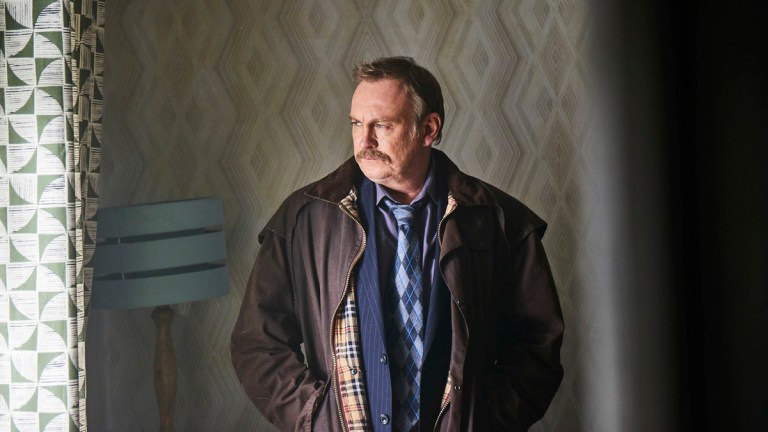Steeltown Murders Review: DNA Drama Rightly Pulls Focus From the ‘Saturday Night Strangler’
The police, the victims and their families are put centre-stage in this true story dramatisation of the hunt for Wales’ first recorded serial killer.

If you’ve ever questioned the need for police resources to be spent on decades-old cold cases, Steeltown Murders will leave you in no doubt. Over four episodes, this BBC drama shows how momentous it is for victims and their families to know the truth about a crime, however much time has passed since it was committed.
In 1973, three Welsh teenagers were murdered in Neath and Port Talbot. Sandra Newton, Pauline Floyd and Gwyneth Hughes were picked up hitchhiking after nights out, and then raped, strangled to death and discarded. For almost 30 years, their families and friends lived without knowing who their killer was or whether he walked among them.
Steeltown Murders shows how those three decades were permeated with grief, regret and guilt – not from the killer, whose motivations and reactions this BBC drama studiously ignores – but from the girls’ loved ones, and from the police who initially failed them.
Police like Paul Bethell and Phil ‘Bach’ Rees (played in the 2000s timeline by Life on Mars’ Philip Glenister and Gavin & Stacey’s Steffan Rhodri, and by Scott Arthur and Siôn Alun Davies as younger men). They were junior officers in the bustling but ineffectual 1973 investigation and became two thirds of the much smaller 2002 investigative team that, with the aid of DNA forensics, closed the case. The remaining third was DC Geraint Bale, played here – if you want a sense of how locally or close to the source this story is being told – by his actor nephew Gareth John Bale.
From the director of The Pembrokeshire Murders and the writer of Manhunt, Steeltown Murders shows how the first investigation failed through a series of blind spots. Jurisdiction boundaries led to a stubborn refusal to link Sandra Newton’s murder to those of Floyd and Hughes, influenced by the belief that Newton’s previous sexual activity on the day of her murder ‘proved’ that she had not also been the victim of a sexual assault by her killer. A mundane but, it later turned out, key statement was not followed up despite a request to do so, and an alibi obtained under duress went by unchecked. Had these mistakes not been made, the girls’ killer might have been identified at the time, but they were made, as catalogued by this drama.
Steeltown Murders documents mistakes but isn’t an expose of institutional wrongdoing. Rather, it’s the more human story of perseverance driven by honourable purpose and the desire to correct injustice. In 2002, Glenister’s character pleads to be assigned the newly reopened Llandarcy murders case, and his understaffed, underfunded team work doggedly to achieve the seemingly impossible. How they manage it is shown to be a mixture of police ingenuity and high-tech expertise.
The investigation is remarkable for involving a number of firsts: Wales’ first recorded serial killer, caught by the UK police’s first use of familial DNA (in which DNA from the crime scene is partially matched with that of a same-sex relative in the police database to approximate that of the culprit) to solve Wales’ longest unsolved case. That alone makes the story worth dramatising, but what makes it truly so is its portrait of the killer’s victims and the devastating effect that their murders had on those left behind.
While Sandra Newton is only seen in photographs, her mother Pat and step-father Dai (played by the excellent Sharon Morgan, and Keith Allen) are featured, as are Denver and Jean Hughes, the parents of Geraldine. In short scenes alongside the police work, real care is taken to explore the parents’ ongoing grief, along with the ruinous shadows cast by suspicion due to the case being unsolved for so long.
Sita, a friend of Geraldine and Pauline invented here but based on several girls they knew – is followed into adulthood. We’re shown her survivor’s guilt and asked to consider the ways that such a violent, unfinished loss lingers over a young person, and a whole community. The threat of the luridly nicknamed ‘Saturday Night Strangler’ remaining at large didn’t only take away the freedom of his victims.
Steeltown Murders presents those victims without over-sentimentality or crass, ominous dread. Pauline and Geraldine are shown as energetic and vital; they’re teenagers having fun, not holy saints, and there’s no sense of exploitation or clumsy emotional manipulation. It’s devastating to watch their scenes because they’re real and made to feel real here, so what was taken from them feels real too.
Airing at a time when policing failures are more visible than ever and tech capability seems to be getting scarier by the minute, this drama runs counter to a few dominant narratives, which makes it valuable. Technology can work miracles, and people can right wrongs, both things it’s worth being reminded of by well-calibrated, responsible true crime dramas like this one.
All episodes of Steeltown Murders are available now on BBC iPlayer.
